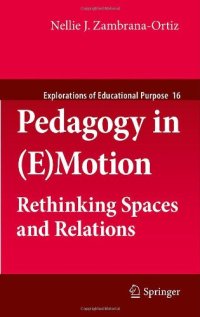
Ebook: Pedagogy in (E)Motion: Rethinking Spaces and Relations
Author: Nellie J. Zambrana-Ortiz (auth.)
- Tags: Teaching and Teacher Education, Cognitive Psychology, Pedagogic Psychology, Higher Education
- Series: Explorations of Educational Purpose 16
- Year: 2011
- Publisher: Springer Netherlands
- Edition: 1
- Language: English
- pdf
This personal, creative, critical work from a leading scholar of psychology is rooted in three novel concepts and aims to share critical pedagogy in the spirit of nascent potential found in the context of a colonial Puerto Rico. First comes the idea of ‘pedagogy in (e)motion’, or the emotional matrix of the teaching and learning process. Secondly, the author explores the notion of ‘street pedagogy’ as a genuine and powerful professional tool. And thirdly, the book underscores what Zambrana-Ortiz calls ‘the interconnection of the artscience within the political and biographical act of teaching’.
The purpose is to inform education teaching practice with the radical framework that, like the neurosciences, believes emotions to be a vital precursor to the planning of action, the process of decision-making and the broadening of our cognitive parameters. The chapters focus on different and yet complementary dimensions of a college teaching initiative boasting a unique interplay between a transgressive narrative, reinvented methodology and authentic samples of students’ contributions to the project. Traditionally, emotional and visceral experiences have been downplayed and rejected as fundamental components of knowledge. This book makes the case for their reinstatement, and proposes that the pleasure and commitment of teaching itself can be seen as resistance given the challenging social and political context, the bureaucracy of the Puerto Rican higher education system, and the cynicism of the self-confessed cognoscenti who think that little political progress can come from within the university system. Such resistance has proved for the author a source of inspiration and has contributed to her creation and reconceptualization of approaches to critical and useful pedagogy.
Dedication
To my students who inspire many stories and provoke many emotions and challenge my capacities…
To Aura, Ignacio and Jaime for their unconditional love and their everyday lessons…
Acknowledgments
Many friends, mentors and colleages from the University of Puerto Rico and United States were very important pieces to my creative work. Thanks to Donaldo Macedo who encouraged the initial proposal and to Joe Kincheloe for accepting it and bringing guidance in the right moment. Colleages like Roamé Torres and Angeles Molina, from their directive positions, were extremely supportive while Sandra Macksoud, José Solís, Pedro Subirats, and Ada Prabhavat gave me guidance and constant insights in editing and translation, as well as crucial material for my narrative. Juan Vadi enhanced my graphic elements with his talent; while college mentors, current colleages, teachers, and former graduate and undergraduate students allowed me to write their stories and reflections binging fresh accents and life to the book. Thanks for ever!
This personal, creative, critical work from a leading scholar of psychology is rooted in three novel concepts and aims to share critical pedagogy in the spirit of nascent potential found in the context of a colonial Puerto Rico. First comes the idea of ‘pedagogy in (e)motion’, or the emotional matrix of the teaching and learning process. Secondly, the author explores the notion of ‘street pedagogy’ as a genuine and powerful professional tool. And thirdly, the book underscores what Zambrana-Ortiz calls ‘the interconnection of the artscience within the political and biographical act of teaching’. The purpose is to inform education teaching practice with the radical framework that, like the neurosciences, believes emotions to be a vital precursor to the planning of action, the process of decision-making and the broadening of our cognitive parameters. The chapters focus on different and yet complementary dimensions of a college teaching initiative boasting a unique interplay between a transgressive narrative, reinvented methodology and authentic samples of students’ contributions to the project. Traditionally, emotional and visceral experiences have been downplayed and rejected as fundamental components of knowledge. This book makes the case for their reinstatement, and proposes that the pleasure and commitment of teaching itself can be seen as resistance given the challenging social and political context, the bureaucracy of the Puerto Rican higher education system, and the cynicism of the self-confessed cognoscenti who think that little political progress can come from within the university system. Such resistance has proved for the author a source of inspiration and has contributed to her creation and reconceptualization of approaches to critical and useful pedagogy. D edication To my students who inspire many stories and provoke many emotions and challenge my capacities… To Aura, Ignacio and Jaime for their unconditional love and their everyday lessons… A cknowledgments Many friends, mentors and colleages from the University of Puerto Rico and United States were very important pieces to my creative work. Thanks to Donaldo Macedo who encouraged the initial proposal and to Joe Kincheloe for accepting it and bringing guidance in the right moment. Colleages like Roam? Torres and Angeles Molina, from their directive positions, were extremely supportive while Sandra Macksoud, Jos? Sol?s, Pedro Subirats, and Ada Prabhavat gave me guidance and constant insights in editing and translation, as well as crucial material for my narrative. Juan Vadi enhanced my graphic elements with his talent; while college mentors, current colleages, teachers, and former graduate and undergraduate students allowed me to write their stories and reflections binging fresh accents and life to the book. Thanks for ever!